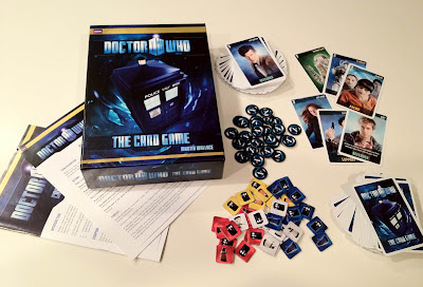 I have become a big fan of the science fiction TV series Doctor Who over the last few years, and while there have been plenty of Doctor Who board games published over the years, lets face it most of them have been pretty terrible. When I sat down at the table at GenCon to demo this game I had high hopes of Doctor Who: The Card Game. The game was designed by Martin Wallace. As the name suggests, Doctor Who: The Card Game is based around a deck of cards. There are also some players tokens used to represent the TARDIS, Daleks, and Time Points. The game takes three or four players, and suggests one hour as the approximate play time. On his or her turn, each player plays cards until he has three left, then passes those to his right-hand neighbor. You'll usually have five cards in your hand: two you've picked up from the draw deck, and three you've been passed by your left hand opponent. There are four main types of cards: locations, enemies, defenders, and support. Locations are played to your tableau and are worth VPs– you get the VPs at the end of the game unless the location is under attack at game end, in which case the attacking player gets the points. Enemy cards are the ones used to launch attacks on other players' locations, and include monsters and aliens from the TV series such as Daleks, Cybermen, and the Master. Defender cards are used to defend your own locations, and represent the Doctor and some of his companions. When enemy and defender cards are both played, their strengths are added up to determine the winner, with defender winning ties. Finally, support cards bring in some of the equipment and allies from the TV series, and can be played for a variety of effects to shake things up a bit. In most turns, you will have just two cards to play, but it's possible to use a reserve (usually limited to two cards) and to buy extra cards. I won't go into all the rules here as they can be downloaded, but the above basic outline should give you the general idea. So what do I think of it? I like rules to be comprehensive and clear. These rules are well-written for the most part, but there are some pretty significant holes. The resolution of conflicts is incompletely described in the rule book and that's pretty important. Some things that seem to happen fairly frequently are not addressed in the rules (e.g. what do you do if you need more TARDIS or Dalek counters than the five provided? can immediate game end be triggered during the usual "end game" phase?) – I hope an FAQ will sort some of this out. But once you've figured out what the rules are intended to be, or house ruled the omissions, the game seems pretty solid. 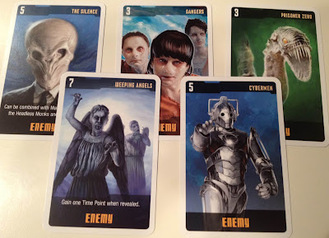 For me, the theme is pretty important in this game. After all, I bought it partly because it's Doctor Who rather than because the mechanisms sounded interesting. The theme is well established by the artwork on the cards. In the TV series, the Doctor and his companions do defend various locations in time and space against a variety of monsters and alien invaders, so the game premise works. The enemy invaders tend to stick to their own kind, and the game encourages you to attack with, e.g., a group of Daleks– it isn't usually possible to mix and match different aliens in one attack. So it's a pretty faithful theme for a simple card game. The theme breaks down a bit if you try to ask the question, "Who am I as a player?" As a player you are rooting for the Doctor in the locations you've played, and cheering the enemies in the locations your opponents have played. Probably it would take a Time Lord brain to make sense of that thematically. The components are good, with nicely rendered artwork, and it's pretty clear to see what's going on. The blue player's tokens easily get hidden on the blue backs of the cards-- but that's a fairly minor niggle. The game plays in an hour, and once players are familiar with the cards, starts to get quite a bit quicker. There are always decisions to make, but I'd suggest it isn't a game to agonize over every card play: it's best played at a reasonable clip. There's lots of bluff-calling in playing the hidden attack and defense cards. There's always a trade off between doing what I want to do, and making sure I don't pass the best cards on to my right-hand neighbor– especially if those cards will let my neighbor attack me! Do I make a move now while my opponent’s defenses seem weak, or do I delay and use my reserve to try to build up a more powerful attack? When I manage to accumulate enough Time Points to buy a new card, I need to choose the right time to do that, as it effectively buys an extra action, or can save me from having to pass that killer card to my neighbor. Locations seem good– they give me victory points if defended properly, after all. But if I've been keeping an eye on who has what cards, I might think I have a better chance by passing it to my opponent and then trying to conquer it. There are lots of trade-offs to think about, but it never gets to complex and brain-melt down. I haven't yet played enough to say whether skill or luck will dominate in this game in the long run, but it doesn't feel impossibly random in my first few plays. 
0 Comments
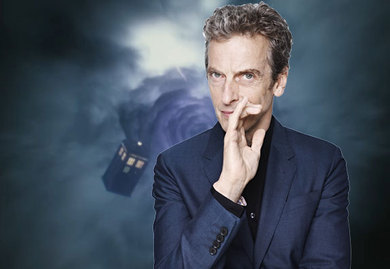 After much anticipation it has finally been revealed who the 12th Doctor will be. There has been much speculation as to who will be playing this iconic role. BBC America did a great job with setting this announcement up quite well by playing the final episode of the 10th Doctor, David Tennat. It was a very emotional way to get this started. All of us have our favorite Doctors. I am sure there are many of you who are sad to see Matt Smith go. However, if you recall, there was quite a bit of backlash over the choice of Smith 4 years ago. I am interested in see what the overall reaction is to the new Doctor. With no further ado, the 12th Doctor is……….. PETER CAPALDI! For those of you who don’t know, Peter has been in many British shows including Torchwood and a previous Episode of Doctor Who. Show runner, Steven Moffat, said that Peter was up for the role of 11th Doctor, but it just didn’t feel right. Now is Peter’s time. Interesting side note... Peter Capaldi, was in World War Z and played a doctor for the World Health Organization.... Doctor W.H.O. love it! Do you think this a good choice? I've been doing some soul searching and coming to grips with the loss of Matt Smith (in spite of it not happening yet) and I think it will weigh up there with the loss of David Tennant. Then I was like, "Wait a minute. They were able to finagle the story to allow for the return of Tennant, could they do it for Smith?!" This launched a theory I have in my head that I have to run by fans that will include some River Song worthy spoilers. If you are familiar with the statements made by John Hurt not too long ago about his character's role in the 50th, then you have nothing to fear. Otherwise, be warned... Okay, so Hurt spoiled that his character, "The Doctor who broke his promise" will indeed be the "true 9th Doctor" and the storyline will have something to do with the Time War. So what does this have to do with 11 and how can he still appear on the show? Stay with me here because I'm about to pull a lot of Who logic, and it could get wibbly wobbly in this piece.
If I had to guess, I would say the inclusion of Tennant and Rose are specifically to help remove Clara (who is signed on for season 8) from the Doctor's time stream and back in the time line. Simple enough, following that logic you could remove 11, as well, and send them on their way, right? Wrong. Seeing as 11 entered his own time stream (something a time lord must never do) I'm guessing there's a fair bit of nastiness that completely prevents him from leaving his own timeline. Plus, let's not forget that he is regeneration number 12. If you don't hold onto the theories that his regenerations from River passed on, then he is in all respects dead to rights after this death. So what if 11 wasn't The Doctor who regenerates?! He would forever be trapped within the timeline and able to appear at any moment to save the day (much like Clara). Tennant of course is now half human so he wouldn't be the one to change, but of course who better than "The Doctor Who Broke His Promise" aka true Number 9 with three regenerations on standby to take on the continuation. There are some parts of The Doctor's memories that I haven't quite worked out yet and how that would work...but I'm sure the Tardis holds a memory bank of the Doctor's thoughts so he could be brought up to speed. Ultimately it would ensure Smith would have the option to return if he wanted. I dunno. Is my theory too crazy? |
Archives
August 2021
Categories
All
|
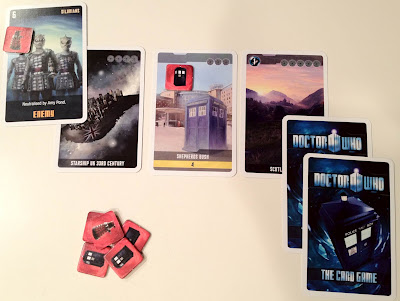
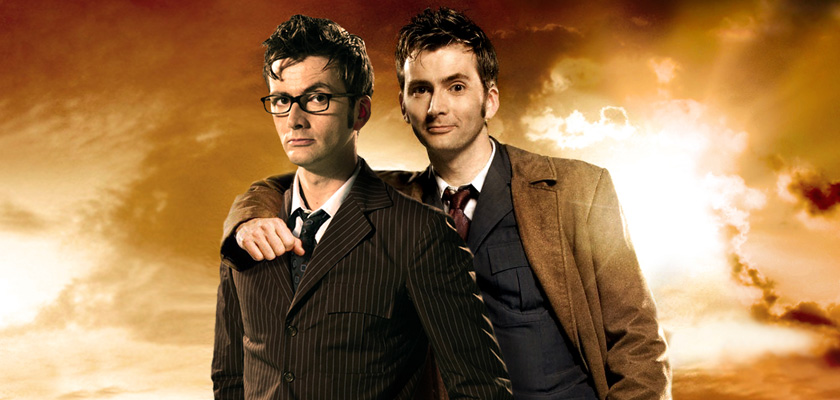
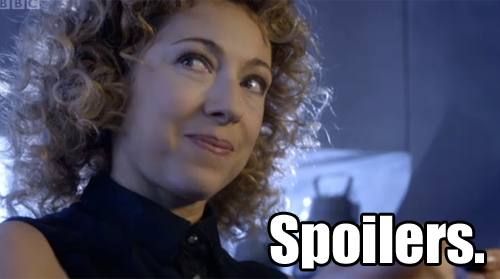
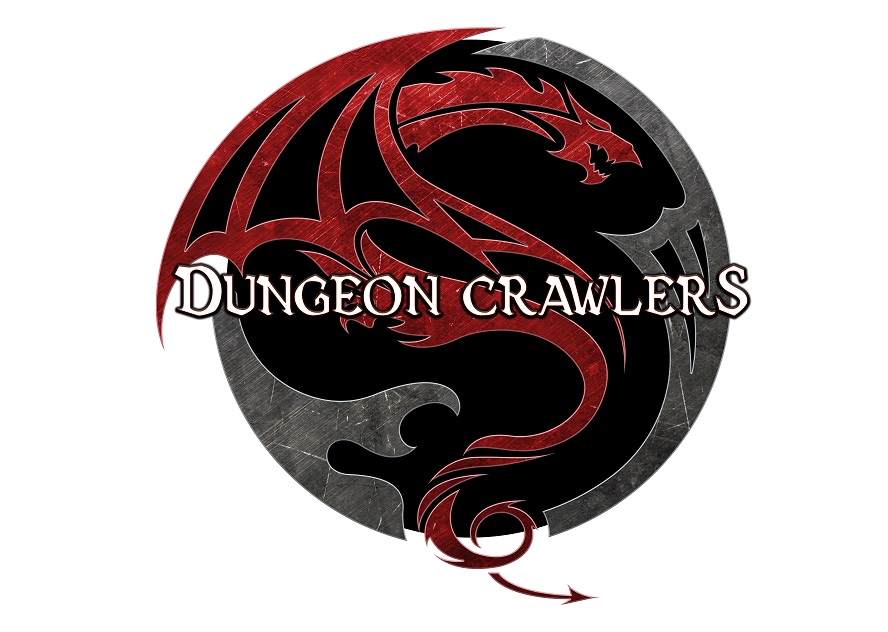
 RSS Feed
RSS Feed








